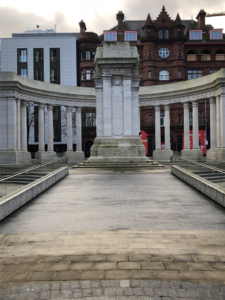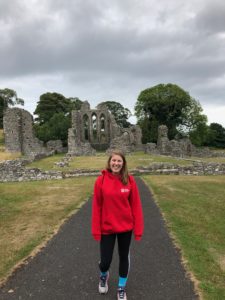
In order to graduate with a degree in history, every student in the major must devise and complete an original research project during his or her senior year. Many take advantage of the wealth of local archives and resources located in the Washington, D.C. area. But some cast their net much wider. Such was the case with Katie Kerekes, who graduated from AU this past spring with a dual degree in History and International Studies. For her senior thesis, Kerekes conducted research on the Belfast Cenotaph in Northern Ireland. Erected in 1929 to commemorate those who had fought and died for the United Kingdom during World War I, the Belfast Cenotaph, located right next to City Hall, quickly became a contested site of competing local agendas and identity politics.

In order to explore these issues further, Kerekes embarked on two separate extended trips to Belfast. The first was in the summer of 2018, when as a study abroad student at Queen’s University Belfast she met with local experts to discuss the politics of commemoration and memory in Northern Ireland. She found that the Belfast Cenotaph was viewed as a flash point between those who wanted to remain loyal to the UK—mostly politically powerful Protestants—and the often disempowered Catholics who didn’t. With the rise of “the Troubles” in the 1960s, the cenotaph became the target of activists who were born long after World War I and wished to use it as a symbol of their own struggles. In order to make use of local archives, Kerekes returned to Belfast in January 2020 with the financial support of the department’s Valerie French and Robert Beisner History Education Fund award. “I’m incredibly indebted to the History Department for providing the funds for my research trip to Belfast,” Kerekes said. “It enabled me to consult public records in Northern Ireland, including the minutes of the war memorial committee from the 1920s.”
Since graduating from AU, Kerekes has been working as a visitor services assistant at the National Museum of African American History and Culture on the Mall. She sees direct parallels between her research on the Belfast Cenotaph and the contested public narratives represented in museums such as the one she now helps to facilitate access to. “Especially right now, people are very interested in the stories that this museum has to tell,” Kerekes said. “I’m glad this museum is open again to continue the dialogue on the history of racism in the United States.” Looking ahead, Kerekes intends to pursue a career in academia or the non-profit sector, where she can continue to apply her research and writing skills first honed in the classroom and field. “I really want my career to be focused on the questions of why we remember the things that we do, and what the implications of that remembering are for peace and social justice.”